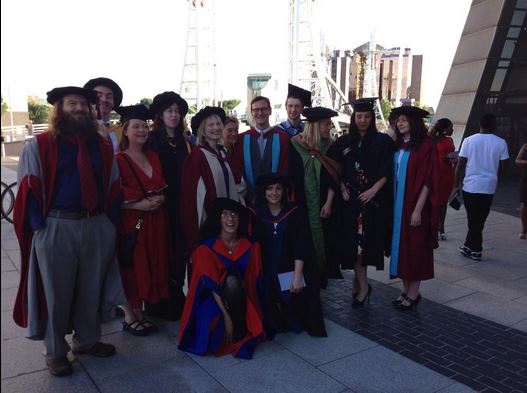Jess Bannister graduated with a BSc (Hons) Psychology and Counselling degree from the University of Salford in 2014. Jess’s dissertation research led to opportunities to speak at local colleges on her experiences of university life and being an undergraduate student. Jess is currently working full time to finance her postgraduate studies in September. Jenna interviewed Jess to find out more.
graduated with a BSc (Hons) Psychology and Counselling degree from the University of Salford in 2014. Jess’s dissertation research led to opportunities to speak at local colleges on her experiences of university life and being an undergraduate student. Jess is currently working full time to finance her postgraduate studies in September. Jenna interviewed Jess to find out more.
1. Hi Jess, you went to talk to Loreto college students about being a psychology student. How did that talk come about?
Originally I was meant to go to Loretto College to recruit participants for my dissertation project, which explored social media use by college students and apprentices. However, the best time for them to participate was June (my dissertation was due in May) so I thought rather than ending correspondence there, I wanted to at least give a discussion or something about what a dissertation is like.
2. What key points did you make in your talk?
I mainly talked about the process of completing my dissertation, making sure I expressed the process of ethics, as that was something I had no idea about going into planning my dissertation. I think that a lot of the beliefs around dissertations is that you can just go away and do something, which is definitely not the case. I also wanted to point out to students that while it is one of the most stressful times in your education, that you can/should still have fun while doing it. The dissertation is often on a topic based around your interests and something that you enjoy, so have some fun with it.
3. Did college students ask you any interesting questions? Can you tell me about some of them.
I was surprised at how engaged the students were in the talk. I was expecting them to be quiet and not wanting to talk to the stranger that’s giving a talk in their class. Through my experiences of being in college, we would have done the same thing. A lot of students were asking how stressful it was doing the dissertation, and asking general questions about university life. A lot wanted to know as well what I was planning to do now that I had left university and now I’m in the wider world.
4. What would you do differently if you were to do another talk?
I definitely wouldn’t be so nervous leading up to the talk. Before I set off on my drive to the college I was so nervous to the point of panicking. While my parents and boyfriend were trying to convince me everything would be ok, I was adamant that everything would go wrong, and everyone would hate me. But obviously I was wrong. I think if I wasn’t as nervous I probably would have included more content in the talk, elaborating more where I needed to instead of just discussing key points because I was worried I would be boring people.
5. What advice did you give to college students thinking about studying psychology at degree level?
I would definitely advise students to read around the subject from day 1. I definitely did not do enough reading around subjects, and only properly opened a book when it was assignment time, and you can tell as that reflects in my feedback. Be a step ahead of your module and it will benefit. Take part in student and lecturers studies as well. If you have no idea what a degree level research project is like, taking part in one can show you what goes on, and also with the amount of equipment there is at university, you can get some amazing ideas for a future research study. The main piece of advice I have though is to have fun. Don’t just be a book worm or spend all your time doing assignments, have some fun too. Uni is the best time for socialising and meeting new people, so get out and meet your peers.
6. How did you find it being a university psychology student? Positives and negatives!
Going to uni has been the best thing I have ever done. It was a hard transition going from college with all my friends to somewhere completely new with people I didn’t know, but I’ve met some of the best friends in the world, and uni has given me a new sense of independence I never knew I could have. I’ll admit sometimes it has been hard, and I’ve thought what’s the point if I’m not doing well, but when you read that email at the end of 3rd year saying ‘Congratulations’, you know that every minute, every moment you felt stressed or upset, or like you couldn’t do it was worth it, because you have earned yourself a degree.
7. What was it like doing your dissertation project? Why did you choose that topic?
Going into my project I thought I was just going to plan what I was doing, then go out and do it, so it came as a surprise to me to hear all these rules and regulations about what you had to do, like applying for ethical approval, and all the materials that had to be included with that. I felt like I had to know what I was doing before I actually had a full idea. But on the whole it was an amazing experience to undertake my own research, and in the midst of conducting research you kind of forget you’re doing this for a 10,000 word report, but you’re actually doing it to extend knowledge in your chosen topic.
I chose my subject for a number of reasons. Firstly, I had done an assignment similar to this one in my level 5 social psychology module, and wanted to extend this, and use participants outside of university to gain more of a generalised view. My supervisor helped me to gain a clearer topic to focus on. I chose social media as my topic because it is such a vastly growing phenomenon that views are constantly changing on it, and it is being utilised for more and more things every day. I had read journals on how students use it for everyday purposes, so I wanted to research how it could be used in an educational setting, and how teachers and peers can use it to give support to other students.
8. What are your next steps?
A. For me, it will be to gain some experience in counselling and mental health, since this is the career path I wish to take. I’ve taken a year out from my studies, which was hard at first adjusting to life outside of education. Since I was a child I have been in education, so it was different not to be. I have expanded my skills, through working full time and volunteering at mental health clinics, and I now feel ready to go back to university and complete my Masters and Diploma in Counselling and Psychotherapy. I have been looking into finance and funding, and have even opened a crowdfunding page, to see if that gets me anywhere. I think the psychologist in me is using it as some kind of social experiment, but we’ll see if anything happens with that. The Masters is a major opportunity for me as not only do I get a placement on the course, but I shadow real life counselling sessions, which will help me pick up the skills I can’t learn in a seminar room or a lecture theatre. I have a long road ahead of me to get there, but I know once I am there, all the hard work will have paid of for me, and also for my fellow students in whatever they’re pursuing.
Best of luck Jess! Keep us all posted 🙂




